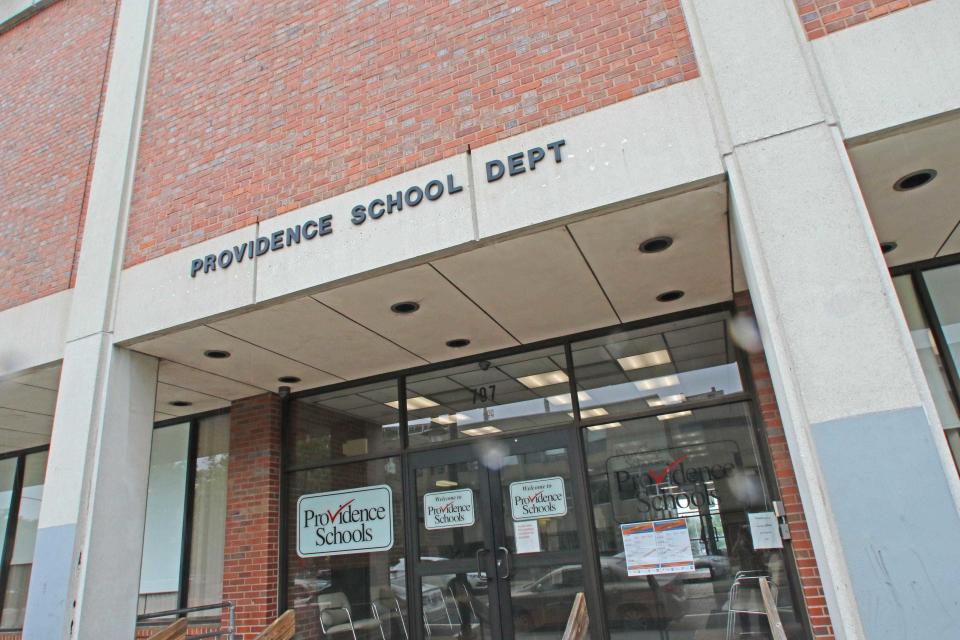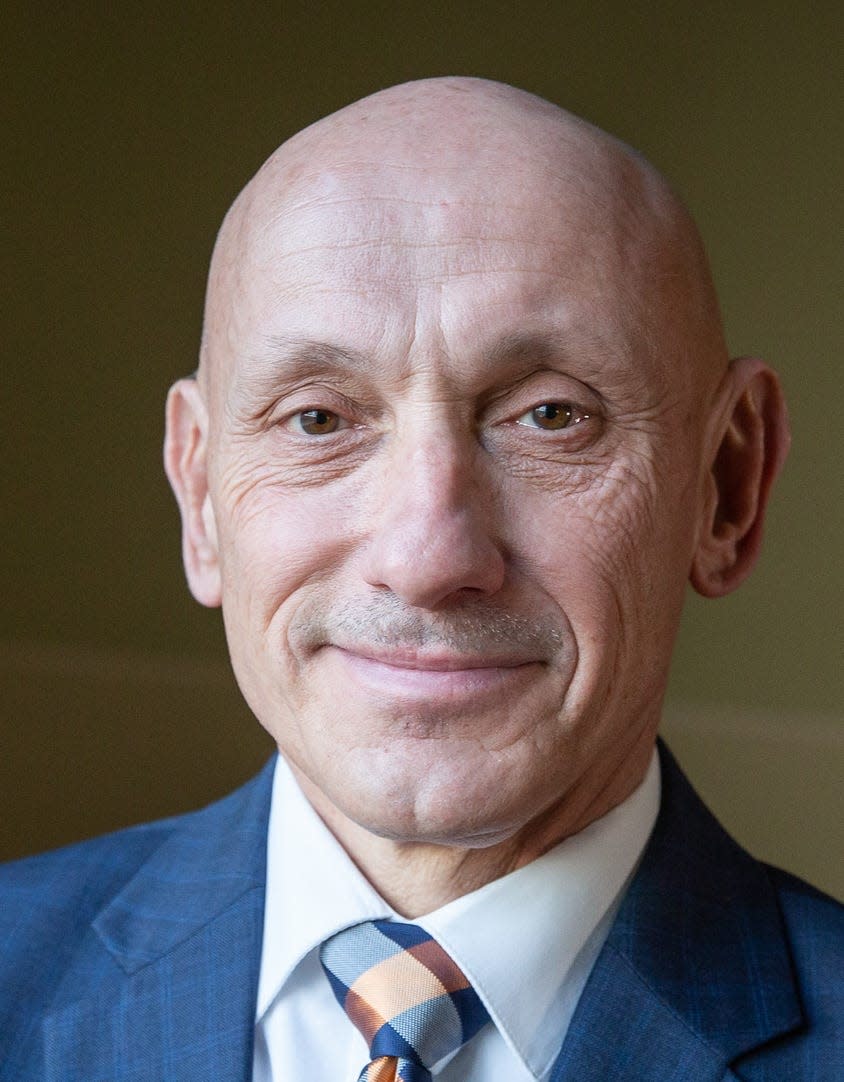Classes done in days: What we found in A-Venture student transcripts and other documents
A-Venture Academy’s Over-Age, Under-Credited program is a type of alternative education meant to do just what the name suggests — provide students struggling in Providence Public Schools with a pathway to graduation.
Earlier this year, allegations of grade inflation threatened to mar the reputation of the OAUC program, as it’s called, triggering an investigation authored by the school department’s own attorney, Charlie Ruggerio. The investigation found that, while there was not evidence of wrongdoing, there was also not much evidence of student work to justify their credits.
Newly-unearthed documents raise questions over how those credits were legitimately earned.

Eight student transcripts obtained by The Providence Journal, along with records of grade changes and email correspondence, show a program with questionable record keeping that fast tracked students to graduation by offering as many as two years' worth of credits in a matter of months.
In certain cases, students earned more than the amount for which the program was intended, and took classes in a single semester that built on each other.
RICAS scoresRI Department of Education releases the standardized test results. Here's the summary
Documents show more credits than program intends, PPSD says classes can be done in 'days'
Each of the students represented by the eight transcripts initially studied at Mount Pleasant High School and transferred into the A-Venture's OAUC program, which is housed at Central High School. They would have graduated in June or over the summer.
Students need to earn 21 credits total throughout their high school careers to graduate. Earning between five and six per school year is normal. The OAUC program, which for some students in the documents lasted roughly three months, is built for earning anywhere from six to 12 credits.
But according to the documents, students received as many as 15 and 16 credits during their time in the program — over the upper limit of what the program is built for.
In one case, a student’s transcript shows geometry, algebra 2 and advanced math taken all in a single semester.
Pandemic learning loss:Reading and math test scores fell across US during pandemic. How did Rhode Island fare?
State Sen. Lou DiPalma, who chairs the Rules, Government Ethics and Oversight Committee, and also received most of the documents obtained by The Journal, questioned how it would be possible to take those three classes at once.
“Geometry, algebra 2 and advanced math you’re taking all at the same time,” he said. “I don’t know how you do that.”
DiPalma, who held a hearing this year on the matter, said he requested the documents and was denied, becoming “extremely frustrated” when he could not get a yes or no answer from the school district on whether he would ever receive the information. Ultimately, he received them in the mail.

PPSD spokesperson Nick Domings said “it is possible for some students to complete some courses in a matter of days” because “students may not be necessarily starting from scratch” and can use “credit mining, pre-tests, project-based assignments, and extended hours,” working for 10 hours every day except Sundays.
The practice of “credit mining” was referenced in the investigation, which described it as a tool to review past work to see if students could be offered partial credit.
The documents also show attendance rates for students before they entered the OAUC program. Out of the roughly 100 students of which The Journal is aware, more than 20 logged 100 or more absences from school before their time in the program.
Bus driver strike averted:Tentative agreement reached with First Student
At the same time, credit mining with work they had done while in high school was used as the district's defense for its issuance of many credits in the OAUC program.
Jeremy Sencer of the Providence Teachers Union said "it’s essential that RIDE and PPSD outline the criteria for credit mining and are able to show what that process involves, particularly when students have had such long term attendance issues."
DiPalma questioned how students who were historically absent would suddenly attend the OAUC program.
The senator isn’t sure whether there will be another hearing in light of the documents.
Grade and graduation date changes raise questions
Despite the investigation’s conclusion, issues within the OAUC program persist. The Journal reviewed copies of an email exchange dated Oct. 28 in which a guidance counselor at A-Venture asked for a student’s graduation date to be changed. The counselor wanted the student’s graduation date to be switched from June 25, 2021 to July 29, 2022. In responding, the district’s Office of Data and Assessment asked PPSD Chief of Staff Scott Sutherland for “some clarity on how to address issues like these.”
“This student was marked as graduated on 6/25/21,” the email says. “There is no entry record for 2022 at all. Please let us know how to proceed as the grades entered for 2022 will never show on a transcript, however without enrollment for last year we can’t make these grades show on the transcript.”
The student’s transcript — a ninth transcript that The Journal received — shows total earned credits were 15, with zero earned in the student's senior year despite being enrolled in classes. However, the “cumulative GPA credits” are listed as totaling 24. The Journal has asked PPSD to clarify the discrepancy and respond to the apparently confusing email exchange, and has not received a response on the record.
Higher education:Post-Secondary Council has yet to begin search for new Rhode Island College president
That wasn’t the only change the guidance counselor sought to make. Documents show that in a separate transcript, on Aug. 3 — just days after the investigation began in late July — the counselor changed four grades from Incompletes to A’s and an A+. The same day, the grades were each changed back to incompletes by a different individual.
Ty’Relle Stephens, a Providence Public School Board member, expressed confusion about the changes.
“Why would they change from A’s to I’s,” he asked, adding, “It doesn’t make sense what they [were] trying to do. I just don’t understand it.”
Allegedly dysfunctional work environment
Two members of the executive leadership team within Superintendent Javier Montañez’s office, who wished to remain anonymous, offered a statement to The Journal alleging “some systemic [dysfunction] that the Commissioner is not correcting,” referring to Rhode Island Department of Education Commissioner Angélica Infante-Green.
“It seems that instead of restructuring A-Venture and correcting the structure of the program, theoption was to hire a guidance counselor that would ‘correct’ errors,” the statement read.
The statement also mentioned the student who was marked as graduated with only 15 credits.
Rhode Island test scores:RI's SAT scores are the lowest in New England, but student participation rates increased
“This information was only made known to PPSD staff through a request to add the additional credits to a transcript by the counselor at A-Venture,” the statement read. “Ethically, this is not only wrong but a disservice to students that were issued a diploma without the skills to support themselves in the future.”
In response to the statement, a small portion of which was quoted in this article, Domings said recommendations were made following the investigation such as “coursework being housed in an electronic database that is easily viewable by administrators, and retaining certain materials for a period of one year following graduation.”
Confidentiality agreements sent out after investigation
According to Stephens, shortly after the investigation into the OAUC program wrapped, PPSD staff were given confidentiality agreements, which not everyone signed. A copy given to The Journal instructs the signee to guard private information and “only access information that I need to perform my job.” The document also states that any document requests from the school board must go to Montañez, and that documents can only come from Montañez and legal counsel.
In Domings' explanation, the purpose of the agreement was to prevent documents from being leaked.
“Administrators received this document precisely to avoid serious breaches of privacy, such as student transcripts being provided to non-school department personnel,” Domings said. “Confidential student records are protected by federal law and the District will take every measure to preserve student privacy.”
What's on the ballot? URI ocean research highlights three asks for state money
Where it all began
Earlier this year, school board member Stephens began raising concern over the legitimacy with which diplomas were obtained after he and two other school board members — Jesus Nunez and Night Jean Muhingabo — received anonymous calls from parents and PPSD employees.
“Some people were afraid to say this stuff to the school legal team because they were afraid they might get fired,” Muhingabo said, adding, “They were scared to speak their mind and they spoke to me.”
Nunez said prior to the investigation, he received the calls “left and right.”
Asked about the nature of the environment within the district, DiPalma said that’s “where I think exit interviews would have been very invaluable to talk about the issue of the culture.”
“We’ve heard from different folks where they went to other districts,” he said.
'Are we shortchanging students?'
Infante-Green’s office did not answer questions related to this story despite multiple chances from The Journal. John Gallo, the head of A-Venture, did not respond to interview offers.
Sencer, with the Providence Teachers Union, expressed empathy for the OAUC program teachers, stating that they "go well above and beyond to do whatever it takes."
More education news:Brown University opens new STEAM lab at Vartan Gregorian Elementary School
However, he raised criticisms of the program, calling it "unfortunate that the teachers have to find ways to meet the needs of [students] because a clear, transparent process with resources for these students [is] not in place."
While DiPalma supports the use of an alternative education model, he still questions whether a disservice is being done to students.
“Are we shortchanging students? We’re shortchanging their families? … It begs those questions,” he said. “And we shouldn’t shortchange anybody.”
Reporter Linda Borg contributed to this story.
This article originally appeared on The Providence Journal: As A-Venture was cleared of grade inflation in RI, new questions arise

